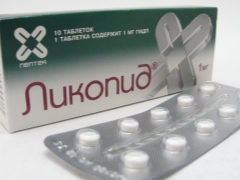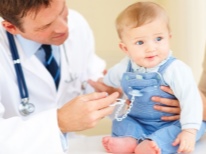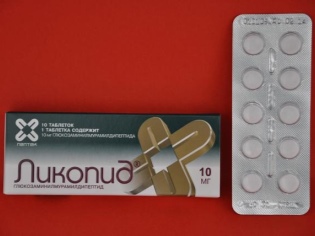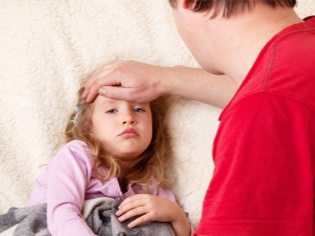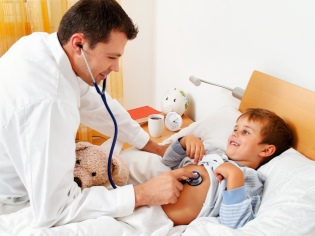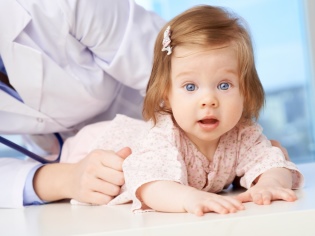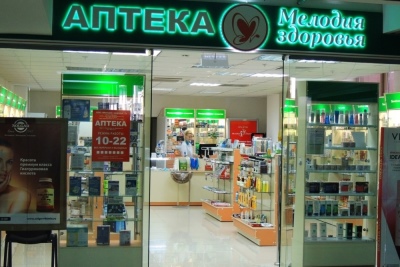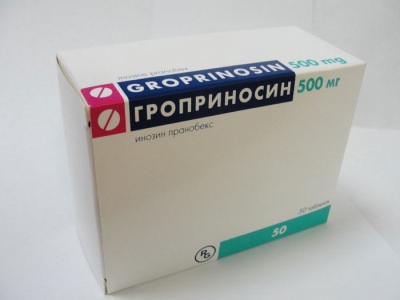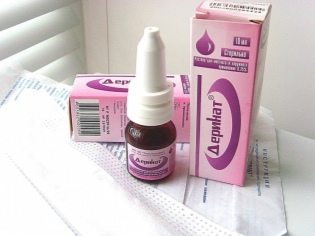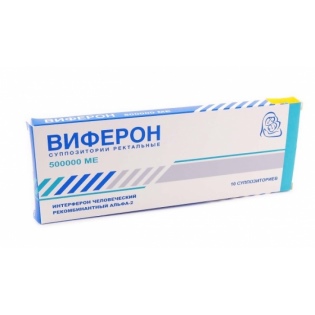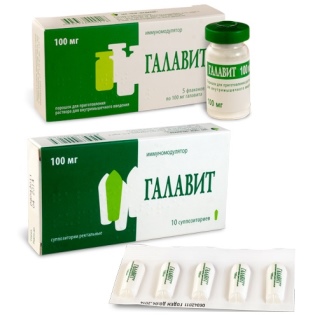Licopid for children: instructions for use
Immunomodulatory drugs are designed to strengthen the body's defenses in order to prevent viral, fungal or bacterial diseases. If the infection still appears, they help to cope with it faster. One of the drugs in this group is Licopid. Is it used in childhood and prescribed for prophylaxis to children?
Composition and release form
The drug is available only in solid form, which is a white flat round pills. They are sold in packs of 10 pieces, packed in one blister. Such forms as syrup, suspension, ointment, capsules or injections, in Likopida not.
The active ingredient in these tablets is a compound called "glucosaminylmuramylpeptide". Its dosage in each tablet is 1 mg. Additionally, the preparation contains lactose monohydrate and methylcellulose, as well as calcium stearate, potato starch and sucrose.
Operating principle
The main component of Licopid, due to which the drug has an immunomodulatory effect, has the same structure as that of the bacterial cell membranes.
Once in the human body, such a compound activates both acquired and innate immunity, as a result of which protection against harmful microbes, fungi and viruses increases. It binds to proteins that are located inside macrophages, neutrophils and other phagocytes, which leads to an increase in the functional activity of such cells. It also activates the formation of B-and T-lymphocytes, antibodies, interleukins and other factors important for immune protection.
Indications
In childhood Likopid demand:
- as a means of treatment chronic respiratory tract infections (bronchitis, sinusitis, adenoiditis, laryngitis, etc.), and also as a prophylactic agent prescribed in the remission stage to prevent the recurrence of such diseases;
- with furunculosis, pyoderma and other purulent-inflammatory diseasessoft tissues and skin. The drug is used in the acute process, and for the treatment of chronic forms of such diseases;
- With a herpes infection, for example, when a herpes virus is caused by a sore throat, a lesion of the eyes or a "cold" on the lips.
Adult pills can be prescribed and to prevent infection of ARVI with the approach of the season of respiratory diseases. However, in children, according to the instructions for the tablets, this prophylactic method is not used.
At what age is it allowed to take?
Children are given only the drug with the content of the active ingredient in a dose of 1 mg. He is discharged from the age of 3. Tablets, in which the active compound is represented by a dosage of 10 mg, do not apply until 18 years.
Contraindications
Likopid do not give the child:
- with hypersensitivity to any ingredient of the drug;
- with exacerbation of autoimmune thyroiditis, as well as with other autoimmune pathologies;
- with temperatures above +38 degrees;
- with metabolic disorders, which should not be consumed lactose and sucrose.
Side effects
The manufacturer calls Licopid a non-toxic drug and says that such a drug does not harm the central nervous system and the cardiovascular system, and does not provoke mutations or changes in the internal organs.
However, in some children, body temperature may rise at the beginning of the medication.Often this is a short-term rise to subfebrile numbers, but sometimes fever is febrile. In this situation, the child is assigned one of the antipyretic drugs, and no need to cancel Licopid.
Also, in extremely rare cases, pill triggers diarrhea.
Instructions for use
A pill is offered to keep the child under the tongue or swallow half an hour before meals. A single dose for children is one tablet, and the method and regimen depends on the disease:
- With chronic infection airway medication dissolve under the tongue, one tablet per day for 10 days. To eliminate relapses, the drug is prescribed in three courses with an interval of 20 days.
- In inflammatory purulent skin pathologies or soft tissue medicine, too, need to be taken only once a day, dissolving the pill in the mouth. The duration of treatment is 10 days.
- When infected with herpes, Licopid can be either held in the mouth or swallowed. In this case, the medicine is taken three times a day, and the course of treatment lasts 10 days.
It is best to take the medicine at the same time. If for some reason the next dose was missed, but it was less than 12 hours from the time when Licopid had to be drunk, the child was given the missed pill. Further, the medication continues to drink according to the prescribed scheme.
If the pass is found after 12 hours or later, you should not drink the missed drug.
In this situation, the medicine is taken according to the initial scheme without a missed dose.
Overdose
Although there were no cases when excess doses of Licopid resulted in a deterioration of the child’s well-being before this time, the manufacturer suggests that after an overdose, the temperature of the small patient may rise. In such a situation, it is recommended to give the child a sorbent and antipyretic medicine.
Interaction with other medicines
- Licopid is often prescribed with antivirals, antifungals, or antibiotics, because it increases the effectiveness of such drugs.
- Simultaneous reception sorbents or antacids will reduce the bioavailability of the active compound Licopid.
- Upon appointment together with glucocorticosteroid drugs, the therapeutic effect of Licopid is weakened.
Terms of sale
Licopid is an over-the-counter medicine, and therefore no prescription is required to purchase it at a pharmacy. However, buying these pills for a child, like any other immunostimulating agents, is not desirable without consulting a doctor. The average price of one pack of tablets with the content of the active ingredient in a dose of 1 mg is 250-280 rubles.
Storage conditions
To the therapeutic properties of the tablets do not deteriorate, the manufacturer recommends keeping them in a place hidden from light, where it is not too humid, and the temperature will not exceed +25 degrees. In addition, such a place should be inaccessible to kids. Licopid shelf life is 5 years. If the date marked on the package has passed, the drug must be discarded.
Reviews
On the use of Licopid in children there are mostly good reviews from both mothers and immunologists. In them, parents note high efficacy and praise tablets for low cost, no side effects and a pleasant taste.
According to moms, the child after the course of Licopid became less sick, or the drug helped cure the infectious disease more quickly. Since the medicine is small and sweet, there are often no difficulties with its administration in young patients.
However, there are also negative reviews, in which they complain about the lack of effect from taking pills. In addition, some parents are frightened that the child reacts to the start of treatment with an elevated body temperature.
More information about the use of "Likopida" for the treatment of children, you will learn from the following video.
Analogs
Other medicines that affect a child’s immune system, such as:
- Groprinosin. Such tablets contain inosine pranobex and are used for herpes, mononucleosis, parotiditis and other viral infections. For children, they are allowed from 3 years, but with a weight of at least 15 kg.
- Imunofan. This medicine in the form of rectal suppositories, nasal spray and injection solution is required for viral diseases and immunodeficiency states. Children are most often prescribed candles, which can be used from 2 years.
- Derinat. Such a preparation based on sodium deoxyribonucleinate is produced in ampoules, spray and nasal drops. Children drops and spray discharged with SARS, prolonged rhinitis, pollinosis, burns, stomatitis and many other problems. The drug is allowed at any age.
- Viferon. The effect of this drug is provided by alpha interferon, so it is prescribed for infections by viruses or for the prevention of such infections. In childhood, rectal suppositories are most in demand, which are used from birth. In addition, the nasal mucosa of a child at any age can be treated with Viferon gel, and the ointment is used in children older than a year.
- Galavit. Such an immunomodulating agent has 3 forms of release - a solution for injections, lozenges and rectal suppositories. Candles and injections with a dose of 50 mg can be used in the treatment of burns, boils, sore throats, adenoids, otitis and other pathologies in children over 6 years old, and drugs with a dosage of 100 mg and tablets are prescribed from the age of 12 years.
